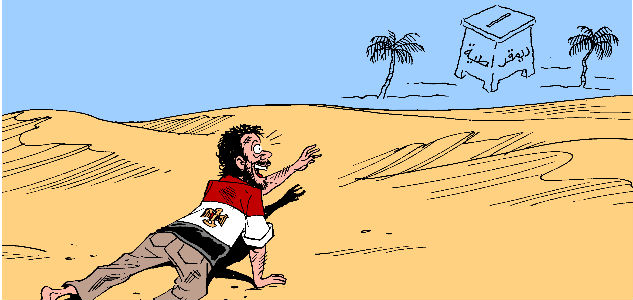
by John Amaruso
A bombing of a police headquarters in Mansoura, Egypt wounded more than a 100 people Tuesday, leaving 14 police and 1 civilian dead. The attack is the latest clash in the escalating political violence following the ousting of Egypt’s former Islamist President, Mohammed Morsi. The attack has been pinned on the vilified Muslim Brotherhood, which has had a violent and bloody past in Egyptian politics. Protesters assembled at the funeral of the victims of the bombing, carrying posters decrying the Muslim Brotherhood’s responsibility for the blast, chanting “The people want to execute the Brotherhood.”
Officials in Egypt have been quick to place blame on the group despite their lack of evidence. The bloodiest attack since Morsi’s removal, officials are looking to impose new anti-terrorism laws, proposing court-ordered bans on the Muslim Brotherhood. Prior to the ousting of former Egyptian President Hosni Mubarak, the Muslim Brotherhood was outlawed, and members were often tortured or imprisoned. The political tension in Egypt has continued to escalate while officials scramble to hammer out details of an upcoming constitutional referendum, scheduled for January 14-15.
Attacks against security forces are amongst the most prevalent, thought to be in retaliation for the military’s role in overthrowing the Muslim Brotherhood’s leader Mohammed Morsi back in July. Thousands of Morsi supporters have been arrested in the wake of Morsi’s removal, and a trial is still pending for the controversial former President.
The biggest target for Muslim Brotherhood protesters is military chief General Abdel-Fattah el-Sissi, seen as the lead figure in removing Morsi from power. Anti-Muslim Brotherhood Protesters in Mansoura held up signs saying “no to terrorist groups”, donning pictures of General Abdel-Fattah el-Sissi.

According to officials a majority of attacks have been in the Sinai Peninsula, a notorious quasi-headquarters for militant groups. The violence has spilled over into Egypt’s capital Cairo as well as densely populated urban areas. The police headquarters attacked Tuesday was the target of a previous attack in July, when an explosive killed one policeman and injured another. Officials are still trying to determine the method of attack. Some believe it involved a suicide bomber driving a truck filled with explosives.
Those interviewed requested to remain anonymous pending the investigation. Observers say the attack was a direct message from militant groups to show the police’s vulnerability in the midst of political turmoil. Protesters and activists opposed to Morsi say the violence only proves the militant nature of Morsi’s supporters and the Muslim Brotherhood.
A New Egyptian Democracy
Mohammed Morsi was the only democratically elected leader in Egypt’s thousands year long history. Following his rise to power, Morsi’s controversial crackdowns on political speech and civil liberties put a damper on the prospects for Egyptian democracy. Morsi maintained the measures were put in place to ensure security in Egypt’s tumultuous transition to civilian rule. Nonetheless observers say this attack does not bode well for Egypt’s democratic future.
While militants struggle to poke holes in Egypt’s security, civilians and protesters are looking for ways to remedy the self-inflicted political turmoil they had hoped would only be temporary. The bombing of a police headquarters in Egypt is only the latest in what may be a long struggle for Egyptian democracy.
Sources:
Leave a Reply